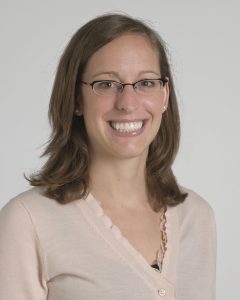Erin Murphy, MD, has been affiliated with the Cleveland Clinic for most of her adult life. Dr. Murphy, a radiation oncologist, began her training there in 2005. Aside from a fellowship at St. Jude’s Children’s Research Hospital, her professional experience has happened at the Clinic.
When Dr. Murphy became an ABR volunteer in 2020, she joined dozens of her Cleveland Clinic colleagues, who give of their time to improve their specialties by helping to create board certification exams. She also had the chance to work closely with physicians from across the country and learn how other institutions and practices function.

“You’re kind of siloed in your job at your own institution, getting through your day-to-day, looking after patients and doing clinical trials,” she said. “It’s really nice to step outside of that and know that there are other people doing really interesting things as well and that there’s a network of colleagues who are all in it together.”
Dr. Murphy started her ABR volunteerism by writing Radiation Oncology Qualifying Exam questions for the pediatrics and central nervous system sections. She specializes in treating patients with brain tumors and any child who needs radiation treatments at the Clinic.
Although she eventually became an oral examiner, she appreciates what she learned as a question writer from her committee colleagues.
“With the written exam, there’s no intense pressure of having a person right in front of you,” she said. “(Writing exam questions is) kind of fun. You learn how other people think about and treat specific diseases, and you can understand different patterns of practice and know what’s OK and what’s not OK. You can learn a bit from that because we’re all trained and know how we do things at our institutions.”
She also enjoys her role as an oral examiner. Her work starts by establishing expectations with the candidate.
“Setting an appropriate tone is a big part of our job,” Dr. Murphy said. “I tell them that we’re going to try to get through this number of cases and that they shouldn’t hesitate to let me know if they have questions. We’re really setting that tone, calming things down. We know everybody is smart, but they’re certainly on the edge that day.”
Oral examiners can only do so much to put candidates at ease. Although examiners attempt to be patient and supportive, real-time feedback about how examinees are doing is discouraged because it could create false expectations regarding the outcome.
“I like to be very positive and encouraging, but you have to make sure you don’t cross a line,” Dr. Murphy said. “I can’t say, ‘It’s fine, don’t worry. You’re doing great. You’re going to pass.’”
As do oral examiners across all disciplines, Dr. Murphy reflects on her days as a candidate while she’s examining. She was tough on herself while taking an initial certification oral exam and understands that candidates often are experiencing similar feelings.
“I remember how intense it was, and I’m very mindful of that for these folks,” she said. “I remember thinking that I would let the world down if I failed one section.”
Whether writing exam questions or serving as an oral examiner, Dr. Murphy believes in the ABR’s important role of ensuring that candidates are knowledgeable enough to safely treat patients.
“As a group, we understand that our job is to make sure that qualified candidates pass and that there will be good radiation oncologists who can appropriately look after patients,” she said. “I think the process is well done and I’m happy to be part of it.”
Dr. Murphy sees her volunteer position as an important way to improve her specialty by helping candidates become better physicians. Whether at the Cleveland Clinic or an ABR committee meeting, she’s thankful to serve the world of radiation oncology.
“I’m grateful for my education, training, and all the experiences that I’ve had,” she said. “Giving back is always a good thing.”


